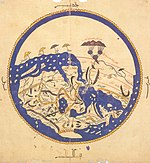Portal:Maps/Selected biography/4: Difference between revisions
Appearance
Content deleted Content added
m adding image caption |
No edit summary |
||
| (4 intermediate revisions by 4 users not shown) | |||
| Line 1: | Line 1: | ||
[[Image:Al-Idrisi's world map.JPG|right|150px|World map by al-Idrisi]] |
[[Image:Al-Idrisi's world map.JPG|right|150px|World map by al-Idrisi]] |
||
'''[[Muhammad al-Idrisi|Abu Abd Allah Muhammad al-Idrisi]]''' ( |
'''[[Muhammad al-Idrisi|Abu Abd Allah Muhammad al-Idrisi]]''' (1100–1165 or 1166) was an [[Arab]] [[cartography|cartographer]], geographer and traveller who lived in [[Sicily]], at the court of King [[Roger II of Sicily|Roger II]]. Muhammad al-Idrisi was born in [[Ceuta]] and died in Sicily, or maybe in Ceuta. Al Idrisi claimed that he was a direct descendant of the prophet [[Muhammad]]. |
||
Al-Idrisi's best known work is his map of the world "lawh al-tarsim" (plank of draught), of 1154. He worked on the commentaries and illustrations for eighteen years at the court of King [[Roger II of Sicily]]. His map is now known as the 'Tabula Rogeriana', his book as the 'Geografia'. His maps were used extensively during the explorations of the era of the [[ |
Al-Idrisi's best known work is his map of the world "lawh al-tarsim" (plank of draught), of 1154. He worked on the commentaries and illustrations for eighteen years at the court of King [[Roger II of Sicily]]. His map is now known as the 'Tabula Rogeriana', his book as the ''Geografia''. His maps were used extensively during the explorations of the era of the [[Renaissance]] like the journeys of [[Christopher Columbus]]. |
||
Latest revision as of 17:15, 31 December 2021

Abu Abd Allah Muhammad al-Idrisi (1100–1165 or 1166) was an Arab cartographer, geographer and traveller who lived in Sicily, at the court of King Roger II. Muhammad al-Idrisi was born in Ceuta and died in Sicily, or maybe in Ceuta. Al Idrisi claimed that he was a direct descendant of the prophet Muhammad.
Al-Idrisi's best known work is his map of the world "lawh al-tarsim" (plank of draught), of 1154. He worked on the commentaries and illustrations for eighteen years at the court of King Roger II of Sicily. His map is now known as the 'Tabula Rogeriana', his book as the Geografia. His maps were used extensively during the explorations of the era of the Renaissance like the journeys of Christopher Columbus.
